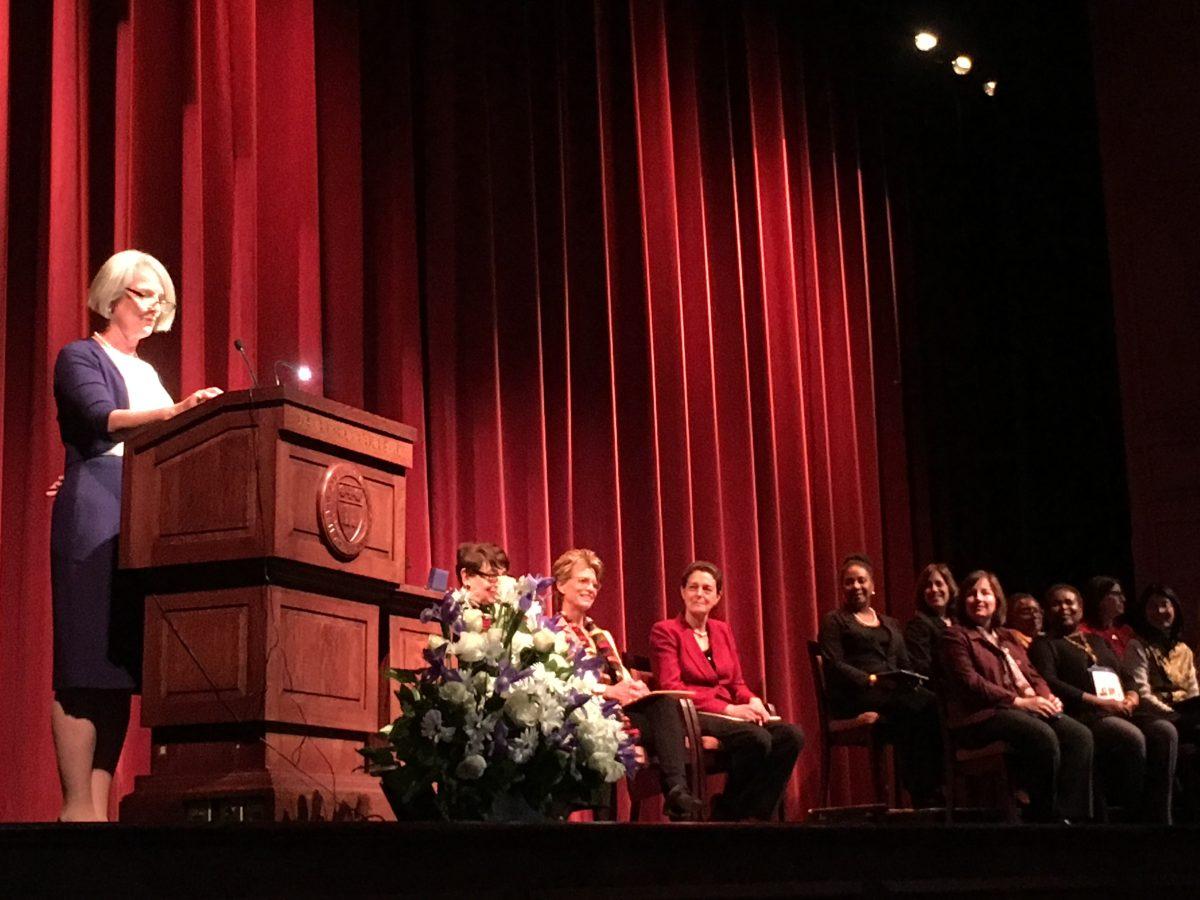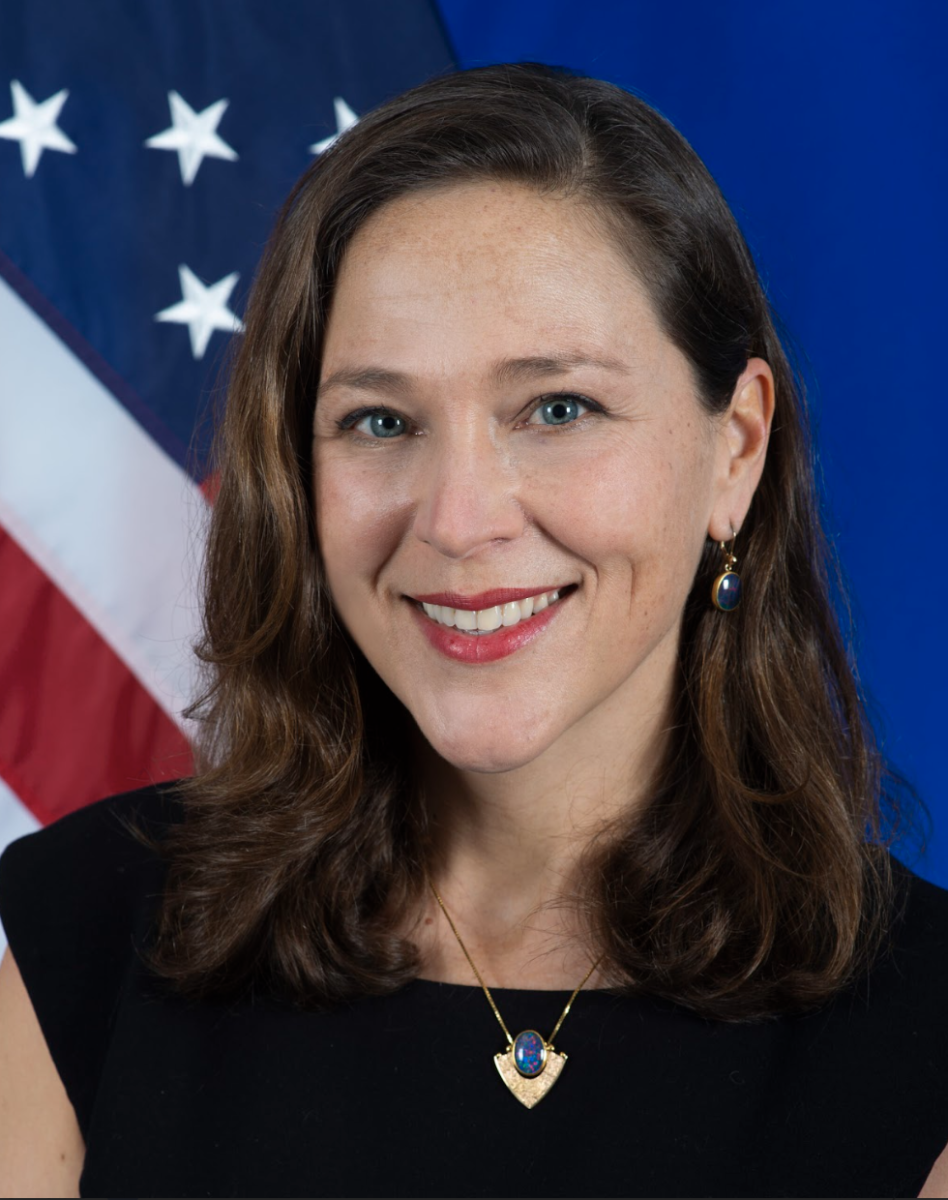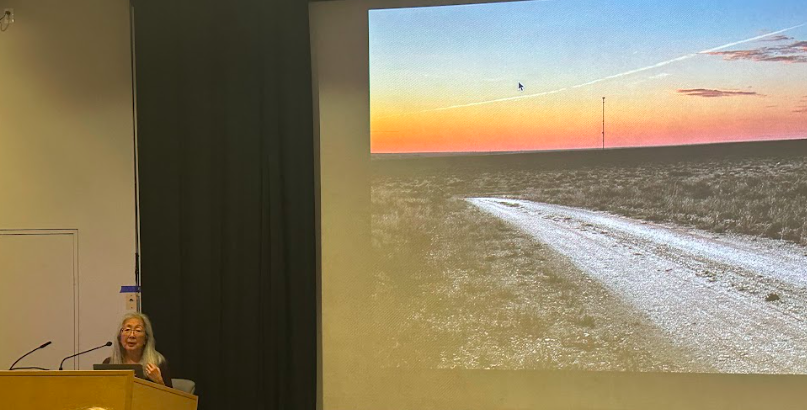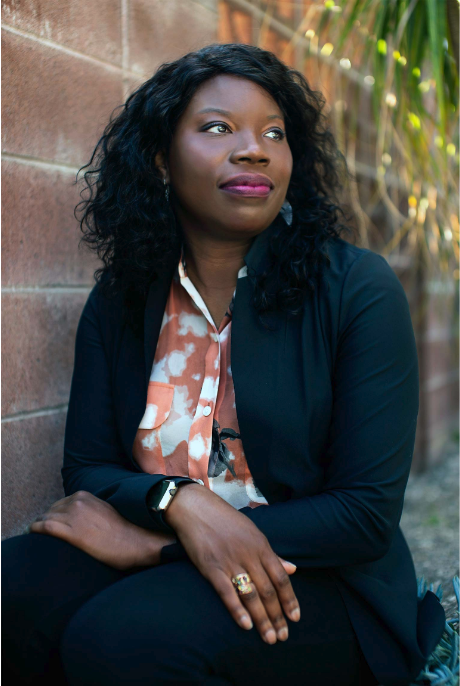Students, families and faculty gathered in Alumnae Hall on Oct. 14 to celebrate the achievements Marian Burros ’54, Maria Morris Hambourg ’71 and Debra Knopman ’75 for their achievements. However different the stories of these three alumnae were, they had one thing in common: none of them had planned for their lives to unfurl in the ways that they did.
Every year, the Wellesley College Alumnae Association presents the Alumnae Achievement Award to graduates for their contributions to a variety of fields. The selection committee looks for alumnae with outstanding and inspiring achievements and reflect the diversity of the Wellesley community. In this spirit of diversity President Johnson explained at the awards ceremony, “A Wellesley woman’s place in the world is wherever she chooses it to be!”
The first award recipient introduced was Burros, who forged a career in food, food safety and journalism. During her junior year of college, she married her husband and began writing recipes with her friend Lois Liebeskind Levine ’52.
“Marrying early gave me a headstart on writing recipes,” she joked.
She and Levine progressed from writing recipes on notecards to writing them on manuscripts, which they brought to parties in case people were interested in buying. At one point, the College wanted to sell their recipe books to fundraise a dancing club for the children of alumnae. From there, Burros’s career started to pick up and she eventually found a publisher for her recipe books and went on to work at major news outlets including The New York Times and The Washington Post. With the new opportunity to work in journalism, Burros felt like the pieces of her Wellesley education and her career were finally falling together.
“What I learned at Wellesley was how to learn, how to think critically and how to ask questions,” Burros reflected.
As she moved through her career, she learned that food and politics were closely tied. At the time, few believed her. But Burros dug deeper, investigating food and food safety. As she started to uncover fraud, Burros was confronted with anonymous criticism and threats. But she pushed through, revealing the truth behind the politics of food.
Returning to Wellesley for the Alumnae Achievement Awards, Burros reflected on the new award and on her life path.
“Well, the award is kind of overwhelming. It makes you stop and take stock of life when the college from where you came and which you admire so much thinks it’s worth recognizing you for your work…So I’m thrilled! I couldn’t be more thrilled,” she said.
Next introduced was Hambourg, another trailblazer. Hambourg started her speech by addressing the students in the audience.
“I know that many of you have a laser focus on your future careers and that you’re already quasi-professionals. Unlike you, when I arrived at Wellesley in ’67, I was not focused,” she said. Hambourg described art as something that she “fell into, without intention.” During her time as a student, Hambourg took an art class on 19th-century French art and was quickly “dazzled by the huge images glowing on the screen.”
Discovering more about art, Hambourg soon started studying at museums in Boston and Cambridge and spent much of her time on campus in the Jewett Arts Center. One of those days spent in Jewett inspired her to pursue a career in art history. Her professor had bumped into her and asked her about her plans after Wellesley. Hambourg, not having any set plans, sought advice from art history faculty, who started to discuss her future and suggested that she go to graduate school.
Hambourg went on to Columbia University for graduate school, where she earned a Ph.D. in art history and furthered her learning in photography. She “loved its window into the real world — its objectivity and its subjectivity.”
Today, Hambourg is celebrated for championing photography and for creating the Department of Photographs at the Metropolitan Museum of Art in 1992.
“Just follow the sparks of interest, where they lead, not where you think they should lead and not where convention leads,” she said to students. “When you see there is no pre-existing structure for what you need… That is how, little by little, we change the world.”
Hambourg encouraged students to find meaning in their work, as a high salary is not enough to live a fulfilling life.
Knopman, the third recipient of the award, was recognized for her work in science and engineering. She came from a large suburban high school and since money was tight, she did not think she would be able to attend Wellesley College. But the financial aid office made it possible, so Knapman entered the College with a sense of gratitude. She came in as a student intending to major in Economics.
“That all changed after the first midterm,” Knopman joked. “Time for Plan B.”
Knopman soon found herself enjoying her science class, which was a lab for non-majors. Outside of science, Knopman also took classes in almost every department at Wellesley.
“I found that my interests did not fit neatly in any one category,” Knopman reflected. She believes this is the same situation as many Wellesley students.
Originally intending to be a science writer, Knopman interned at Science magazine. After living in Israel to study water-resource management in the Middle East, she attended MIT for her master’s degree in civil engineering and then became a Luce Scholar, spending a year in Taiwan to learn about water resources. She then went on to work with Senator Daniel Patrick Moynihan on energy and environmental issues.
Knopman’s life took many twists and turns as she seized new opportunities as they arose. Eventually earning a Ph.D. at Johns Hopkins University in the Department of Geography and Environmental Engineering, becoming director at the Center for Innovation and the Environment and later serving as vice president and director of RAND Infrastructure, Safety and Environment (later Justice, Infrastructure and Environment), Knopman never stopped making an impact, whether her work was in writing, policy or research.
“I hope my story is some inspiration to all of you who are not sure what you’re going to do with your lives and feel bad about it. Don’t feel bad about it! Feel very good because it means you have limitless possibilities. Trust your instincts. And whatever you do, do a good job at it,” she said.









